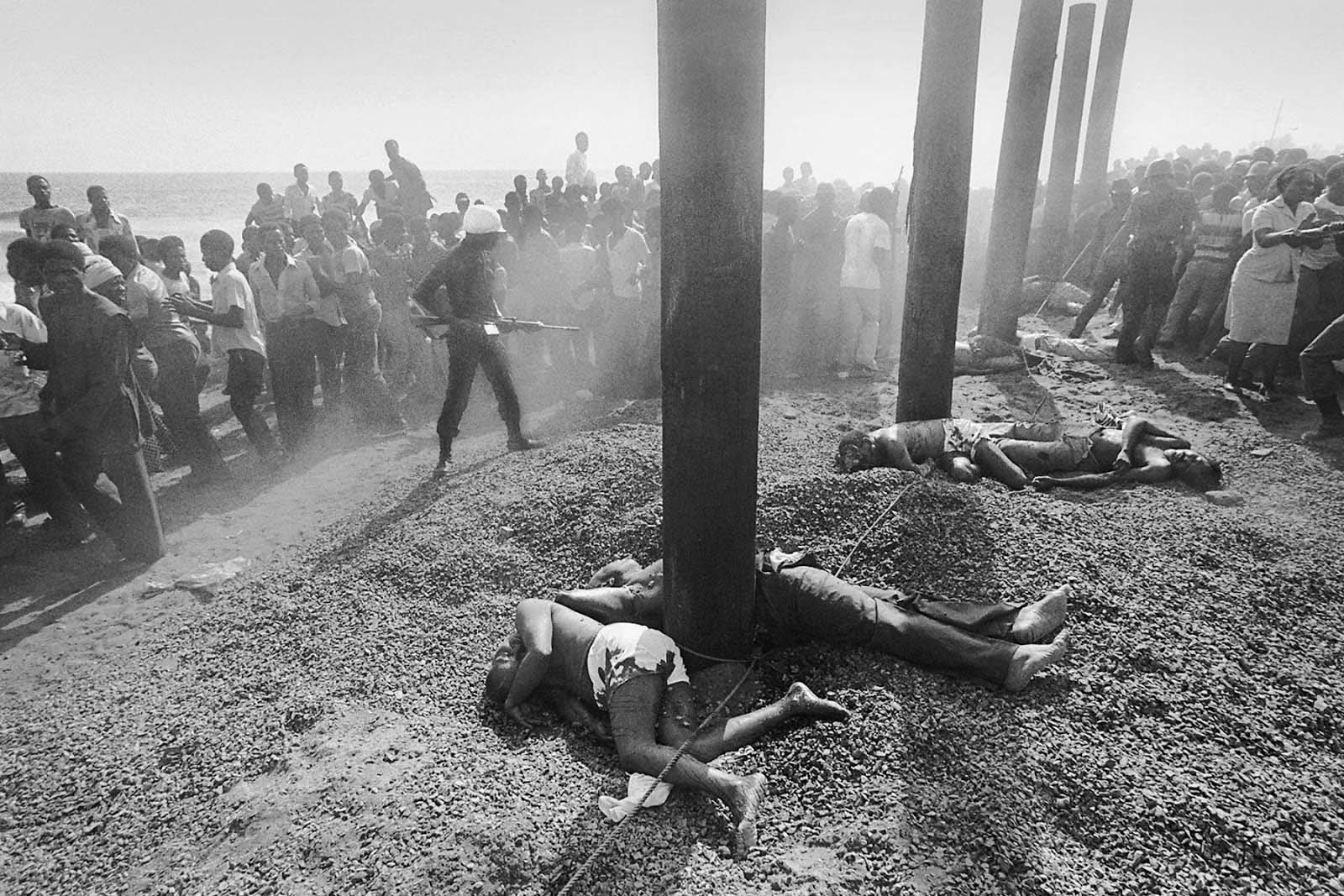(2 of 2)
After the Takeover, Revenge
Victims buried in a mass grave as Doe consolidates his power
A crowd of angry Liberians shouted insults and hurled rocks last week at the body of their assassinated President, William Tolbert, which had been dumped in a mass grave alongside 27 other victims of a predawn coup d’état the previous weekend. Pockets of loyalist resistance remained; there was at least one fight between opposing military factions.
For the most part, however, the new government, led by a natty master sergeant named Samuel Doe, 28, appeared to be in firm control.
One of Doe’s first acts after seizing power was to order the release of some 50 leaders of the opposition Progressive People’s Party whom Tolbert had jailed early last month. One of his next acts was to order the immediate roundup of 91 officials of the Tolbert regime. Within days, eleven former ministers, including Tolbert’s brother Frank, a onetime leader of the Liberian Senate, were standing trial on charges of “high treason, rampant corruption and gross violation of human rights.” Several others, among them the slain President’s two sons, were in hiding.
On arrival in Monrovia, the Liberian capital, late last week, TIME Nairobi Bureau Chief Jack White found the country quickly returning to normal. Reported White: “On the 30-mile drive from the airport into the city, there were few visible signs of the revolution. A red-and-white banner draped on a building read, OUR EYES ARE OPEN: THE TIME OF THE PEOPLE HAS COME. At the modernistic executive mansion where Tolbert had died, security was minimal. A lone trooper stood watch at the gate, while a mere handful of armed soldiers milled around inside.
At the seaside Ducor Inter-Continental Hotel, a sign in the lobby admonished guests to obey the dusk-to-dawn curfew. Its message: STAY OFF THE STREETS AND STAY ALIVE.”
The coup set off a wave of elation among Liberia’s native population, usually called “country people.” Waving palm fronds and chanting anti-Tolbert slogans, thousands poured into the streets. Many of them flocked to the John F. Kennedy Memorial Medical Center to jeer at the exhibited corpses of Tolbert and the others who had been killed in the fighting. Later the bodies were bulldozed into a mass grave in downtown Monrovia as hundreds looked on approvingly.
Like most of his political predecessors, Tolbert was one of the “settlers,” or Americo-Liberians, descended from the freed American slaves who founded the West African nation in 1847. Throughout Liberia’s history, the settler group dominated both the government and the economy of Africa’s oldest republic, despite the fact that it represented only about 3% of the country’s 1.7 million people. Tolbert, a Baptist minister who had served 20 years as vice president, made a degree of headway in reforming the top leadership after he assumed the presidency in 1971. Alarmed by an outbreak of rioting last year over a government proposal to raise the price of rice as a spur to production, he supported a constitutional amendment giving most tribal Liberians the right to vote for the first time. But this reform came too late to assuage a growing civilian opposition to his rule as well as deepening resentment in his own armed forces. In the end, it was a band of country people in the enlisted ranks of the army who overthrew him.
Sergeant Doe, now Africa’s youngest strongman, became enraged at Tolbert during last year’s rice riots. A brisk, jaunty, slightly built man, he is the son of an impoverished farmer from the small Krahn tribe. He left school after the eleventh grade and joined the army. Last year he took an advanced training course from a U.S. Army special forces detachment in Liberia. Like Flight Lieut. Jerry Rawlings, 33, who led a coup in neighboring Ghana last year, Doe has a flair for the dramatic. During his first TV address as head of state, he wore sunglasses and a well-pressed fatigue uniform with a hand grenade dangling from one pocket. Newly installed in the executive mansion, Doe summoned the ranking U.S. diplomat, Chargé d’Affaires Julius Walker, and sent his new Foreign Minister, former Opposition Leader Gabriel Baccus Matthews, together with a contingent of troops, to get him. Matthews showed up still dressed in the tattered shorts he had been wearing when released from jail only a few hours before.
Doe spoke last week of seeking good relations with all “peace-loving nations,” and ended his speeches with the P.P.P. opposition slogan, “In the cause of the people, the struggle continues.” Western diplomats believe his coup was motivated primarily by resentment against the long-dominant settler community. But Doe has said he is not out to persecute the Americo-Liberians, emphasizing: “I can assure you we are not for discrimination.” He pledged himself to fight both the country’s raging inflation and its 50% unemployment rate. One of his first decrees, which was both a gesture of gratitude and a bid for future support, was to raise the monthly pay of Liberian army privates from $85 to $250 a month. ∎
A Liberian army soldier stands ready to execute a former cabinet minister following the 1980 coup. The minister in the photo: Cecil Dennis.
On April 12, 1980, Samuel Doe led a military coup, killing President William R. Tolbert, Jr., in the Executive Mansion. Twenty-six of Tolbert’s supporters were also killed in the fighting. Shortly after the coup, government ministers were walked publicly around Monrovia in the nude and then summarily executed by a firing squad on the beach.
The military coup is still surrounded by mystery. Apparently, the preparations for it went unnoticed, which is astonishing, given the fact that there was considerable political tension and also in light of the well-staffed U.S. Embassy in Monrovia (over 500 people). The events had taken them all by surprise. Samuel Doe was not a publicly known figure in Liberia before April 12, 1980. That soon changed after that date.
The military take-over was a bloody one, labeled ‘a revolution’ by the 18 enlisted men of the Armed Forces of Liberia who toppled the Government of William R. Tolbert. The 66-year old president was savagely murdered by private soldier Harrison Pennoh, who later proved mentally unstable. Before the end of the month the entire Cabinet had been put on trial and sentenced to death – with no right to be defended by a lawyer and no right to appeal to the verdict.
Ten days later after the coup Cecil Dennis (Minister of Foreign Affairs, the person to the right on the first photo) and twelve other government officials were taken to a beach, a block south of the Barclay army barracks west of the Executive Mansion, and murdered in front of screaming crowds of jubilant indigenous Liberian citizens. It was a nightmarish scenario.
Cecil Dennis faced death very bravely, staring at his killers while awaiting his fate. When he mouthed a prayer before being shot, a soldier loudly shouted, “You lie! You don’t know God!”. After the order to fire was given, a drunken executioner may have winged him but the other bullets missed altogether, splashing into the Atlantic Ocean behind him. He was the only person still alive after the first barrage of gunfire. Two more soldiers finally approached and sprayed Cecil with a Uzi and pistol at point-blank range, hitting him in the face, body and head, until he was dead. Each man was later hit with 50 or 60 extra bullets by the drunken soldiers.
Master Sergeant Samuel K. Doe is shown shortly after he took control of the Liberian government in 1980.
This coup d’état marked the end of the Americo-Liberian rule, which had lasted since independence. Liberia was a colony started by a private organization based in America, called the American Colonization Society. The A.C.S. was a group composed of evangelicals and abolitionists, who felt that, due to racism against freed slaves, newly freed slaves would have greater freedom in Africa. So they established this colony, independently of the U.S. government. In other words, white Americans were afraid of the rising number of freed slaves and considered it to be best to send them to Africa. The British had started doing the same in Sierra Leone, right next door. The freed slaves and their descendent became known as Americo-Liberians.
The Americo-Liberians of course knew little about the African culture their ancestors had before becoming enslaved. They had European-American educations and knowledge. So they ran the colony as some kind of little America in Africa. Which ironically included enslaving the indigenous people and suppressing them. Liberia was even kicked out of the League of Nations because of slavery.
There were regular insurgencies and riots occurring. When Doe took over and killed Tolbert and his supporters this marked the end of the Americo-Liberian rule. Doe was eventually tortured and killed in front of a camera when Prince Johnson and Charles Taylor launched a military campaign against him. Eventually Charles Taylor was elected and then a second civil war started to dispose of him.
Interesting fact:
- A decade later, Doe was captured in Monrovia by faction leader Prince Y. Johnson. Doe was taken to Johnson’s military base and tortured before being killed and exposed naked in the streets of Monrovia. His ears were cut off, then some of his fingers and toes; the next day the rest of his body was cut up, cooked and eaten. The spectacle of his torture was videotaped and seen on news reports around the world.







